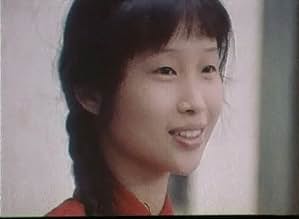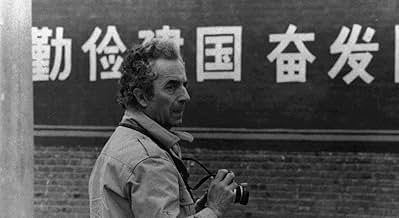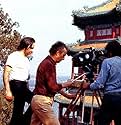Adicionar um enredo no seu idiomaA documentary on China, concentrating mainly on the faces of the people, filmed in the areas they were allowed to visit. The 220-minute version consists of three parts. The first part, taken... Ler tudoA documentary on China, concentrating mainly on the faces of the people, filmed in the areas they were allowed to visit. The 220-minute version consists of three parts. The first part, taken around Beijing, includes a cotton factory, older sections of the city, and a clinic where... Ler tudoA documentary on China, concentrating mainly on the faces of the people, filmed in the areas they were allowed to visit. The 220-minute version consists of three parts. The first part, taken around Beijing, includes a cotton factory, older sections of the city, and a clinic where a Caesarean operation is performed using acupuncture. The middle part visits the Red Flag... Ler tudo
- Direção
- Roteiristas
- Artista
- Narrator
- (narração)
- (não creditado)
- Direção
- Roteiristas
- Elenco e equipe completos
- Produção, bilheteria e muito mais no IMDbPro
Avaliações em destaque
The narrator Giuseppe Rinaldi tells us at the start of the film that they wanted "to show a picture of China, we can't offer more,". So Antonioni and his crew spend their time filming faces and the everyday activities of the people of China, in order to get a feel of a country living under communism. The footage is equally as fascinating as it is strangely eerie. The first section, which takes us around the city of Beijing, shows the famous city as a indistinguishable sea of expressionless faces, dressed in similar colours of blues, browns and greys, with nothing apparent to separate them by social class or even occupation. This is of course one of the defining ideals of socialism - true equality - but this doesn't look like a liberated nation, and actually paints a picture of misery and quiet suppression.
The film does capture some wonderful activities, however, namely the squirm-inducing Caesarian performed with nothing to numb the pain but acupuncture, and the footage of workers performing Qigong in the streets (and one gentleman whilst riding a bike). But Antonioni wasn't interested in just filming social habits, and his determination to get a real grasp of the country comes from the moment when he escapes from his tour guide (he refused to stop the car) to film a small factory-based community, where the inhabitants stare at the camera with nervous curiosity, possibly at the first Westerner they've ever come across. It's a very patient approach, a trademark of the great auteur, but often the camera lingers for too long, capturing very little, and the wonderful acrobat show at the climax proves a welcome piece of entertainment. Yet this is no doubt the definitive documentation of a period of Chinese history now looked back on in disdain and embarrassment.
www.the-wrath-of-blog.blogspot.com
Alas Cina in my opinion stayed quite objective, and doesn't offer any judgmental criticism through its eye in the camera lenses, either for or against policies that unfolded in front of them. For the period of time that Antonioni and his crew were the host of the Communist Part in the middle of the Cultural Revolution, what we got instead was an extremely fascinating look at the facets of live within the iron curtain, from major sights and recognizable attractions, to the lesser seen mundane activities of the everyday lives of the average joe.
A magnum of a movie unfolding itself in 3 parts, we begin this rare look of a journey into China during its Revolution, and if pictures can tell a thousand words, what more moving images? Starting off at a defining location in Tiananmen Square, there are some subtle differences at the Square then, and now. The theme song for the documentary happened to be "I Love Tiananmen Square" which schoolchildren sing with gusto, and we see later how the little tykes get indoctrinated quite innocently through propaganda infused into song and dance that they participate enthusiastically. Besides this recognizable landmark, it became like a journey through time as we also get to look at The Forbidden City, as well as The Great Wall in its pre-restored state of today, sans millions of tourists too, and witness broken, unmended sections that riddled the monument which was referred to as not one built by an Emperor, but one built by slaves.
It's a rare treat indeed because the filmmakers dare to push the boundaries of permission granted to them, where on occasions even after explicitly being told "No" to filming a particular moment or location, the camera still rolls anyway, and we're told and get to see just exactly what was forbidden, which I think in today's context, is nothing to get riled up with. We get an observation of a slice of everyday life, where the camera lingers on to provide strange yet intriguing images such as a typical work day in a factory, women with bound feet, and amazing sights and sounds such as a man riding a bicycle and practicing Qigong simultaneously! We also get explained certain policies of the communists at the time, which seem quite unbelievable that home rentals are capped at 5% of whatever your monthly salary is, or how workers work with a general lack of anxiety and urgency.
In true Antonioni fashion, we get to see luxurious shots of vast landscapes in the country as they make way to the rural areas, such as the Honan Province and the Yellow River, in a balance with city landscape shots in Shanghai and Suzhou. It's this fine balance of the rural and the urban, of Chinese people living and working in both contexts in the country, that I thought makes this documentary quite a winner.
But what was truly fascinating, were the carefully prepared episodes that pepper the documentary. One unforgettable episode that you must see for yourself, is something of a celebration of Chinese traditional medicine vis-a-vis modern Western medicine. I just cannot imagine how acupuncture is used as an anesthesia for a Cesarean section, as we see incredibly long needles poked into a woman to numb her womb and nerves, as doctors both work on getting her newborn out, while talking, and feeding(!) her at the same time! It's so unsettling at I was tempted to look away when the scalpel cuts through flesh, yet on the other hand, just refused to blink with wide-eyed amazement at how this feat was performed, and wondered if it's still being performed until this day! Something else I found peculiar, was how the last act rattled on like an acrobatics variety show. Granted that for an audience of the time, they might have found it to be an experience watching it, but somehow, I thought it was a sense of deja vu, whether or not having to watch that particular segment on some other variety show on television (could be this one, I'm not too sure), but the stunts performed were found to be quite familiar. I believe some would have made their way as a standard export items for travelling Chinese acrobats to arm themselves with in their travels overseas, and I'm fairly certain some I've seen in Chinatown some years back. But anyway, it's still quite something Cina as a documentary film was one which was draped with fascination for both filmmakers as well as an audience, rather than championing anti-whatever sentiments from either side of the world. Not having seen many movies, either features, shorts or documentaries made during the Cultural Revolution era or about that era in question (propaganda included), I think this Antonioni film has more than made its mark as a definitive documentary that anyone curious about the life of the time, would find it a gem to sit through.
Você sabia?
- CuriosidadesIn 1972, during Mao's Cultural Revolution, Michelangelo Antonioni was invited by the People's Republic of China to direct a documentary about New China. The result was a three-and-a-half-hour long film, divided into three parts. Mao disliked it so much that Michelangelo Antonioni was consequently charged with being anti-Chinese as well as counterrevolutionary. The movie was finally shown at Beijing's Cinema Institute 30 years later.
- Versões alternativasThere is an Italian television version running 220 minutes, and a USA television version running 104 minutes.
- ConexõesFeatured in Michelangelo Antonioni - O Olhar que Mudou o Cinema (2001)
- Trilhas sonorasWo ai Beijing Tian'anmen
Music by Yueling Jin
Lyrics by Goulin Jin
Principais escolhas
- How long is Chung Kuo: China?Fornecido pela Alexa
Detalhes
Bilheteria
- Faturamento bruto mundial
- US$ 16.196



















